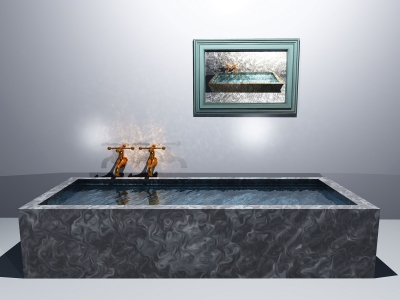In her 1963 book, The Bell Jar, Sylvia Plath wrote, “There must be quite a few things a hot bath won’t cure, but I don’t know many of them.” Her words ring true even today; a hot (or warm) bath is a cure for pretty much anything that ails you. While showers are easy, practical, quick and eco-friendly, baths win hands down when you want to take a journey within and reclaim your serenity and peace. That leads me to this fascinating study linking autism and hot baths.
A December 2013 study presented at the American College of Neuropsychopharmacology (ACNP) Annual Meeting reported that a soaking in a hot bath reduced repetitive behaviors and improved social communication in children with autism.
For the study, Dr. Eric Hollander, a professor at Albert Einstein College of Medicine in New York, and his team recruited 15 children on the autism spectrum. The children spent 30 minutes on alternate days soaking in tubs with water heated to 102 degree Fahrenheit versus in a tub heated to 98-degrees. The children showed improvement on the days that they soaked in the hotter water of 102 degrees.
The study was based on the theory that autism is a pro-inflammatory condition. People on the autism spectrum may have overactive immune systems and high levels of inflammation in their bodies. Explaining the findings of the study, the researchers say, that the high temperatures of the bathtub mimicked fever in the body. Raising the body temperature through the means of a hot bath tricked the body into thinking that it had fever and triggered the release of anti-inflammatory signals that alleviated the behavioral symptoms.
I found this study insightful and think that the potential of triggering anti-inflammatory signals in the body, through something as simple and inexpensive as a hot bath, is immense! Inflammation plays havoc in our bodies in numerous ways, ranging all the way garden-variety aches and pains to arthritis to cancer. What if a daily bath prevented or alleviated the symptoms of some of these conditions, in addition to calming anxiety, promoting sleep and reducing stress? Sounds wonderful, no?
Furthermore, the urge to take baths is a primal one. We have been hooked on water ever since we were a collection of teeny-tiny cells. Before we were land creatures, we were aquatic ones. As fetuses, we bobbled around in the warm, dark amniotic fluid of our mother’s wombs for nine months. In the warm, watery environment of the bathtub, we return to our embryonic states.
Draw yourself a bath, light a candle or two, throw in some epsom salts and add some essential oils if you wish. Skip the artificially scented fake bubbly stuff, they just dry out your skin. Adjust the temperature of the water (I cannot handle very hot water) and soak. Twenty (or thirty) minutes later, when you emerge from the bathtub, you will feel like a newborn without a name, innocent and radiant, seeing the world with fresh eyes, for the very first time.
Sources:
- American College of Neuropsychopharmacology (ACNP)
- Goodreads; Sylvia Plath
- Image Credit: Freedigitalphotos.net
